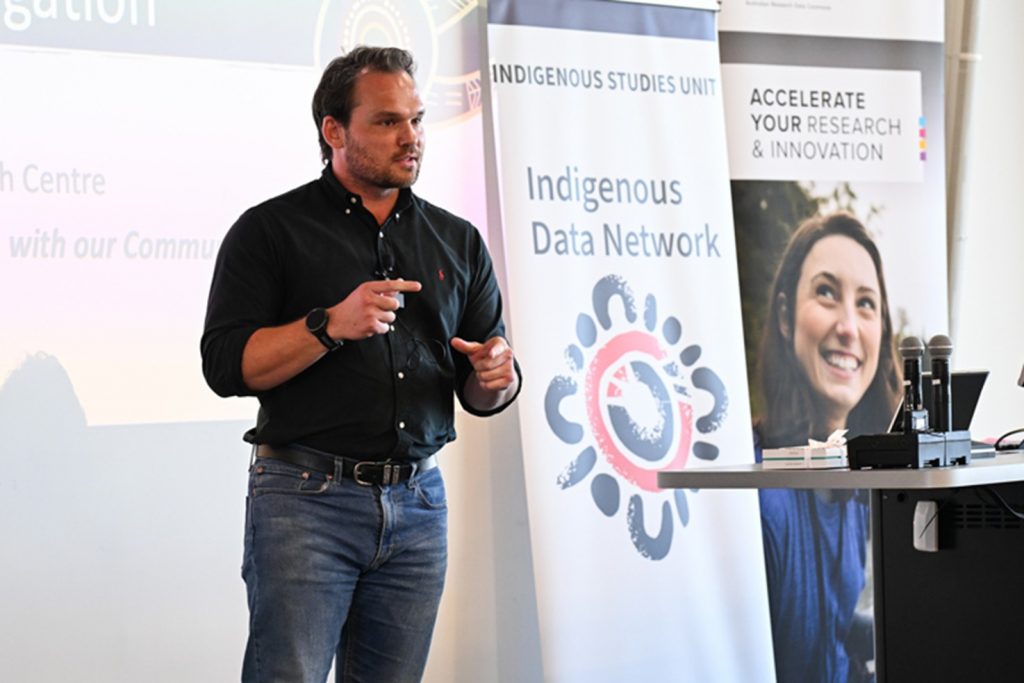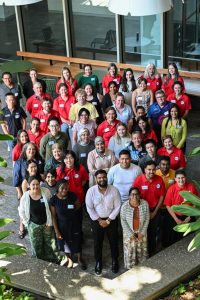
Reflections on the Inaugural Indigenous Datathon 2025
Written by: Bernadette Hyland-Wood
17 Oct 2025

Datathons are a unique experience. People from many backgrounds come together for a weekend and dig deeply into data that are often unfamiliar to them. Last weekend (11-12 Oct 2025), a group of about 40 people from Alice Springs to Melbourne gathered at QUT Gardens Point Campus in Meanjin (Brisbane). We came together to explore real-world questions using data science, guided by the CARE Principles (Collective Benefit, Authority to Control, Responsibility, Ethics) of Indigenous data governance.
Led by the Indigenous Data Network based at the University of Melbourne, co-convenors including the Australian and New Zealand Intensive Care Society (ANZICS), the Australian Institute of Health and Welfare (AIHW), QUT Centre for Data Science (QUT CDS), the Australian and New Zealand Dialysis and Transplant Registry (ANZDATA) and the Aboriginal and Torres Strait Islander Community Health Service Brisbane (ATSICHS-Brisbane) gathered to support participants for the inaugural Indigenous Datathon focusing on healthcare data.

The event supported participants to explore real-world questions using data science, guided by the CARE Principles (GIDA, 2019). CARE Principles guide those of us on Collective Benefit, Authority to Control, Responsibility, and Ethics of data governance.
Participants came from around Australia. They are hospital Aboriginal Liaison team leaders, healthcare data analysts, bio-informaticists, primary care clinicians, nephrologists and intensive care physicians, workforce planning specialists, and Aboriginal Islander peak body representatives. Postgraduate students and early-career researchers participated too as they are the next generation of data scientists, healthcare professionals, and digital storytellers.
Participants worked in teams to analyse datasets on healthcare while learning how to apply ethical, culturally responsive data practices. Using provided datasets, we assessed the consistency of the Indigenous identifiers, and gleaned insights. We were reminded that although the datasets are de-identified, each row represents a person who experienced an acute health condition, sought care, and entrusted their information to the Australian or Aotearoa/New Zealand healthcare system.

Participants tackled questions related to patient information provided during ICU admissions and routinely in chronic kidney replacement therapy in Australia and New Zealand. Healthcare professionals shared helpful context. For example, the prevalence of kidney failure treated with Kidney Replacement Therapy (KRT) is 1,099 per million population in Australia and 1,064 per million population in New Zealand. But for First Nations peoples in Australia, that is 2,139 per million population. In NZ, the rate for Māori and iwi people is 1,19 per million population compared with 522 per million population for non-Māori people.
We heard stories not just told from data, but lived through it. These were stories shaped by culture, Country, family, and connection. Each dataset we worked with was far more than numbers on a screen. It represented real people and real journeys. Our mentors reminded us that behind every data point is a life, someone’s parent, child, or loved one, woven into a community and carrying a story that deserves to be honoured. These data are not abstract or anonymous; they are part of living knowledge systems that come with deep responsibilities of care, respect, and stewardship.
Over two days, each team shared a five-minute presentation of what they had discovered. Some brought the data to life through storytelling, tracing a de-identified client’s path through the healthcare system. Others created striking visualisations to illuminate their insights. Across these diverse approaches, a shared message emerged: we need better tools and pathways for communication to improve the patient journey. One powerful finding showed that when an Aboriginal Liaison Officer was present, health outcomes were significantly stronger. This was a testament to the importance of culturally safe care.

Every team grounded their recommendations in Indigenous Data Sovereignty and the principles of self-determination and governance. And while two teams were named as finalists, every participant, mentor, and volunteer walked away with something just as valuable. We departed having made new friends (and possible collaborators!) and with a deeper awareness of the vital role that community access, ownership, and use of data play in creating change. Together, we came to understand more clearly the transformations needed to achieve better health outcomes for all Australians, with particular care for Indigenous peoples.
Our work was never about reducing human experience to numbers. It was about using data to amplify stories, challenge inequities, and spark change. At its heart, this was a collective commitment to use knowledge, respectfully and responsibly, to improve lives, guided always by the ethical principles of respect, beneficence, and justice.
If you get the chance, join an Indigenous Datathon, say yes! What you learn will stay with you long after the datathon ends. Bring your curiosity and listen with humility and you’ll walk away with insights that no dataset alone could ever teach you.
Photo credit: ARDC and Marc Grimwade Indigenous Datathon 2025
The Indigenous Datathon was supported by the Australian Research Data Commons (ARDC).
This was a brilliant event. I was part of the second wining team, but do not have any photo. Would you mind sending me one at elo.le.gal@gmail.com
Feel free to keep me updated as I would like to join other similar events, noting that I am particularly interested in the legal aspects of data.\
Very well done. Kind regards, ELodie LE Gal (Phd)
Great summary…..I’m interested to know how this exercise sparks change in the health system across Australia, particularly in Indigenous remote communities where the need is greater than urban communities for our people.